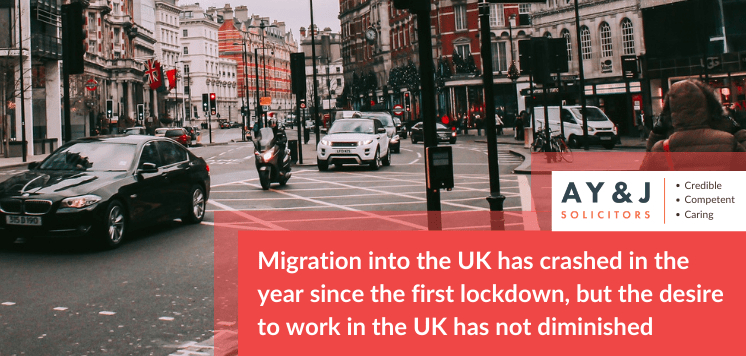It is too early to know the exact effect Brexit will have on migration, and we now have to also consider the pandemic which is arguably a more profound factor in the patterns of global migration. Coronavirus will continue to influence global movements throughout 2021 and 2022.
In terms of the effect of Brexit and the new immigration law in the UK, the UK government estimates the points-based system will reduce annual migration from long-term EU workers by over 70% during the first five years of the policy implementation. This means a decline in long-term EU worker inflows, from over 100,000 to between 20,000-40,000 annually. This reduction in long-term EU migrants is estimated to have a cumulative fiscal cost of between £1 billion and £3 billion over the first five years of the policy (2021 to 2025).
The newly updated lower skill threshold of the proposed point based system makes 151 new occupations eligible for the long term non-EU workers. This lowering of the skill requirement, in conjunction with lower salary thresholds, are assumed to increase the immigration of this group by between 10,000 to 30,000 per year.
This increase in long-term non-EU worker migration is estimated to have a potential cumulative fiscal benefit for the UK of between £1 billion and £4 billion over the first five years of the policy.
The estimates seem to be accurate. At A Y & J Solicitors we have seen a surge in interest from Asia and this is all driven by specific relaxations in UK immigration rules. When we analyse the new system, rather than deterring people, the measures put in place are encouraging more people to come to the UK – which is the message the government would seem to have people believe.
The Government’s estimates, however, do not consider the effects of the pandemic. While there have been no definitive studies on the effect coronavirus has had on UK migration, initial studies suggest the impact has been profound.
A blog published earlier this year by the government-funded Economic Statistics Centre of Excellence (ESCoE) reported up to 1.3m people born abroad left the UK between the third quarter of 2019 and the same period in 2020. Estimated 700,00 foreign-born residents have moved out of London, constituting the largest exodus in the UK since World War II.
Another recent study by the Office of National Statistics predicts the effect will be substantial.
Drawing from a wide range of sources, the study found a substantial decrease in passengers travelling internationally, along with a fall in the number of visa applications issued for work and study to non-EU nationals. There was a significant decline in work-related activity for non-British nationals and non-UK-born residents. It also recorded a decline in the number of National Insurance numbers (NINos) allocated, which are needed to work in the UK.
The report concluded that these combined factors suggest ‘mobility and migration have changed significantly since March due to the impact of the coronavirus pandemic’.
Since 2016, the long-term international migration to the UK was stable, but the 12 months leading up to the pandemic, driven by an increase in non-EU student arrivals (mainly from China & India), saw migration levels jump, taking the net migration for the year up to March 2020 at around 313,000.
Visa applications & grants, affected by travel bans & lockdowns fell significantly between April and June 2020 (the first UK lockdown). Long-term work and study visas were down by 85% and 99%, respectively when compared to the same period in 2019.
However, as visa application centres reopened from June 2020, there was an uplift in applications being issued between July and September 2020, but figures were still lower than the same period in 2019. In the year ending September 2020, 93,000 work and 161,000 study visas were granted, which is 100.000 and 41,000 fewer work and study visas respectively.
The uplift recorded when visa centres opened, along with the large rises in inquiries we have seen at A Y & J Solicitors, suggests that the demand is there and remains buoyant.
Another factor which supports this is the rise in applications for Tier 1 (Investor) visas which are issued to non-UK individuals if they have a minimum of £2m to invest in qualifying assets in Britain.
In the first quarter of 2020, 45 people applied, in the second quarter only 23 applied but in Q3, there were 96 applications. Approx 45% of the total applicants were from mainland China (23) and Hong Kong (20). Russians and Americans constituted 9% applications each.
While the numbers are still low, they suggest a resurgence in interest in the UK as a destination for the world’s wealthy.
When final Tier 1 Investor visa numbers for 2020 are released there is still expected to be a drop on numbers from previous years, due to the pandemic. In 2018 there were 376 such visas issued, in 2019 there were 360. In the first three quarters of 2020 there were a total of 164.
Meanwhile, in the UK, where employers need to be registered to employ migrants coming to the UK on Tier 2 visas, only a small percentage of businesses are on the approved sponsor list. There are just over 33,000.









